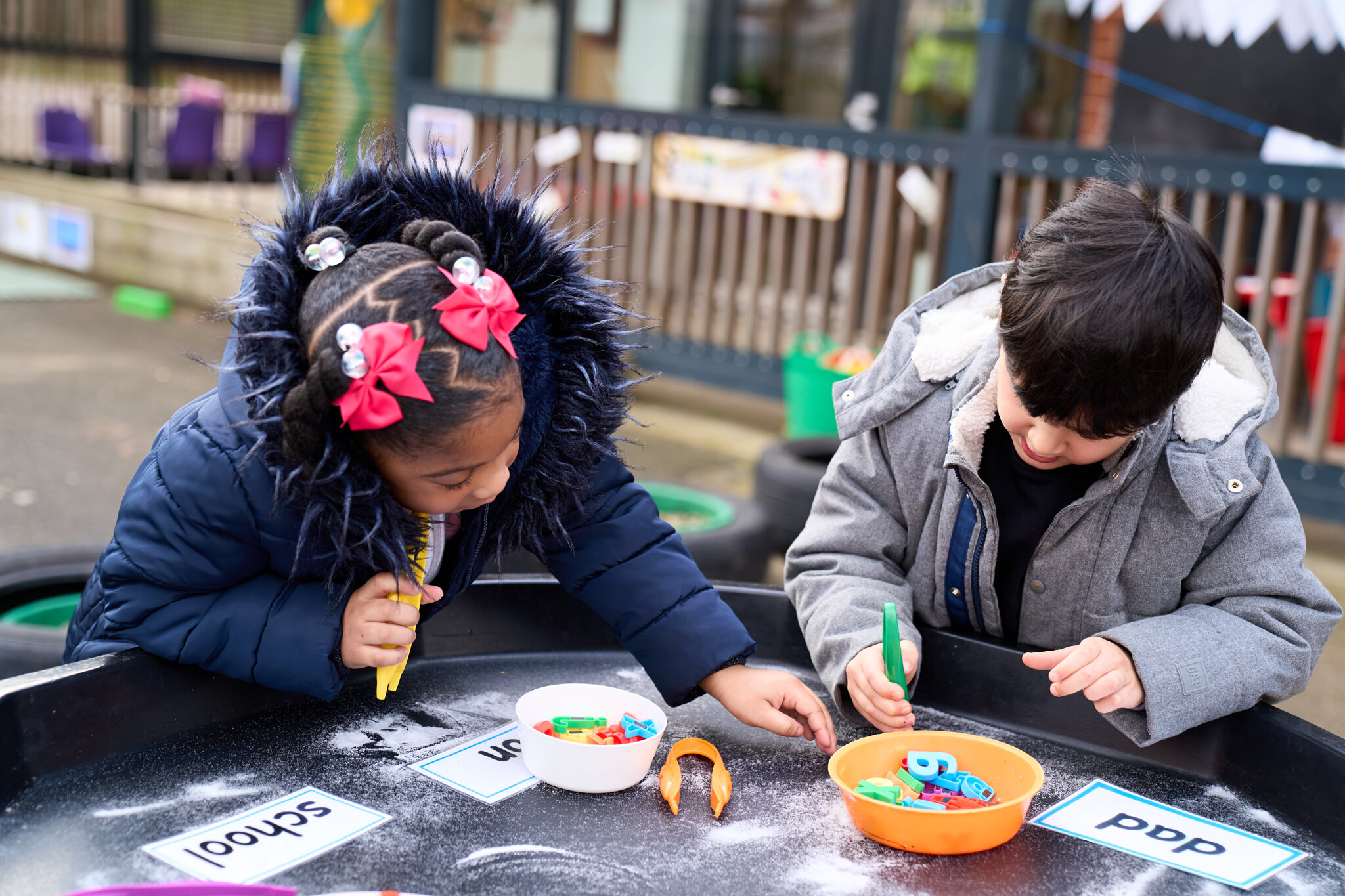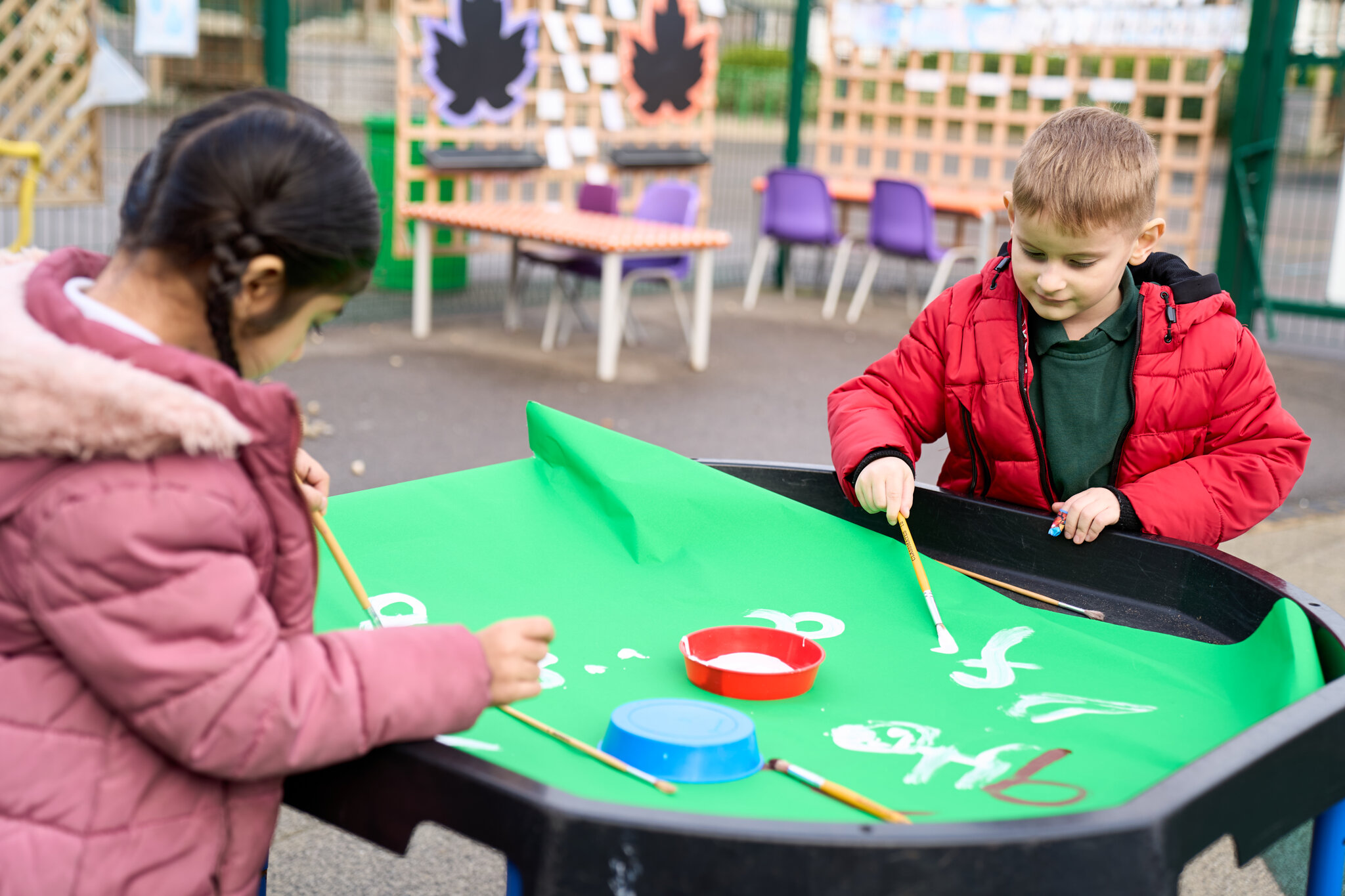Reading
Following the National Curriculum, we teach systematic synthetic phonics using the scheme Little Wandle. This develops children’s understanding of phonemes and systematically encourages accurate decoding and blending.
We use Daily Supported Reader as our scheme for developing early reading competence across the early years and into Key Stage One.
This teaches reading in a systematic and repetitive way to embed their learning. It develops talk during reading, answering direct questions and enriches vocabulary. Children are exposed to quality texts and through talk and teacher modelling/shared writing children develop as confident writers.
_(1).jpg)
.jpg)
.jpg)
At Rushey Green we believe that a quality English curriculum should develop children’s love of reading, writing and discussion. We aim to inspire an appreciation of our rich and varied literary heritage and a habit of reading widely and often.
We recognise the importance of nurturing a culture where children take pride in their writing, can write clearly and accurately and adapt their language and style for a range of contexts. We want to inspire children to be confident in the art of speaking and listening and who can use discussion to communicate and further their learning.
We believe that children need to develop a secure knowledge-base in English, which follows a clear pathway of progression as they advance through the primary curriculum. We believe that a secure basis in English skills is crucial to a high-quality education and will give our children the tools they need to participate fully as a member of society.
Phonics
.jpg)
.jpg)
.jpg)
It is essential that our approach to teaching phonics and reading is accessible to all learners, regardless of background, and that it promotes and fosters a life-long love of reading from the very beginning of their school journey. Intent Phonics (reading and spelling) at Rushey Green Primary, we believe that all our children can become fluent readers and writers. This is why we teach reading through Little Wandle Letters and Sounds Revised, which is a systematic and synthetic phonics programme.
.jpg)
_(1).jpg)
.jpg)
We start teaching phonics in Reception and follow the Little Wandle Letters and Sounds Revised progression, which ensures children build on their growing knowledge of the alphabetic code, mastering phonics to read and spell as they move through school. As a result, all our children are able to tackle any unfamiliar words as they read. We also model the application of the alphabetic code through phonics in shared reading and writing, both inside and outside of the phonics lessons and across the curriculum. We have a strong focus on language development for our children because we know that speaking and listening are crucial skills for reading and writing in all subjects.
.jpg)
.jpg)
.jpg)
For reading across Key Stage Two, children take part in daily Destination Reader (DR) lessons which encourage children to develop rich and purposeful talk around a text. Through our DR lessons, children have the opportunity to explore vocabulary, different question types and embed a range of strategies to show their comprehension of what they have read.
The strands that we use are:
- Questioning
- Predicting
- Making connections
- Inference
- Clarifying
- Evaluating
We encourage the children to use a range of skills and therefore combine strategies during their reading sessions.
These aims are embedded across our English lessons and the wider curriculum. We have a rigorous and well organised English curriculum that provides many purposeful opportunities for reading, writing and discussion.
Teachers adapt the CUSP schemes of work as appropriate to their classes, but also ensure that cross curricular links with concurrent topic work are woven into the programme of study. Our curriculum closely follows the aims of the National Curriculum for English 2014.
The National Curriculum for English aims to ensure that all pupils:
· read easily, fluently and with good understanding
· develop the habit of reading widely and often, for both pleasure and information
· acquire a wide vocabulary, an understanding of grammar and knowledge of linguistic conventions for reading, writing and spoken language
· appreciate our rich and varied literary heritage
We value reading as a crucial life skill. By the time children leave us, they read confidently for meaning. Our readers are equipped with the tools to tackle unfamiliar vocabulary. We encourage our children to see themselves as readers for both pleasure and purpose. Because we believe teaching every child to read is so important, we have a Reading Leader who drives the early reading programme in our school.
Parents and Reading
We recommend that parents regularly listen to their children read and read to their children using a variety of ever changing books. This enhances the enjoyment of reading and parent workshops share information on how we teach reading.
Writing
.jpg)
.jpg)
.jpg)
The CUSP curriculum encourages children to develop and discuss grammatical and punctuation features and place these features in context through well-structured model texts. Children are able to develop their oracy skills by learning vocabulary, words and phrases that broaden and enrich their discussions and responses to literature. Children are encouraged to become authors through making connections, practicing, applying in order to independently use the knowledge they have gained through their writing process.
Spelling from Year 2 to Year 6 is based on the No Nonsense Spelling programme. In Year 2 and Key Stage 2 three sessions of spelling are taught three times a week.
Handwriting is an important part of the curriculum. Children are encouraged to develop cursive, joined, legible handwriting. In early years, children are taught letter formation. By KS2, children are encouraged to join their letters to increase the pace of their writing
.jpg)

.jpg)
.jpg)

The National Curriculum for English aims to ensure that all pupils:
- write clearly, accurately and coherently, adapting their language and style in and for a range of contexts, purposes and audiences
- use discussion in order to learn; they should be able to elaborate and explain clearly their understanding and ideas
- are competent in the arts of speaking and listening, making formal presentations, demonstrating to others and participating in debate. Able to make connections to self and wider world.
Speaking and Listening
There is a huge emphasis on speaking and listening from an early age, encouraging children to ‘play’ with language and to be able to articulate their thoughts. We begin early, with the use of rhymes and songs to develop understanding. As they progress through the school, children are encouraged to discuss their learning, develop their confidence and increase their enjoyment of language through performance, debate and public speaking.
.png)